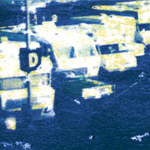|
|
 |
Dusted Reviews
Artist: Lusine Album: Serial Hodgepodge Label: Ghostly International Review date: Jan. 25, 2005 |

|
|
|
 |
One difficulty with the always problematic, by now hopefully outmoded descriptor "IDM" is that it left ambiguous the locus of its so-called "intelligence." Was this music supposed to be the creation of superior minds, programmed and sequenced in smart and uncanny ways that evaded conventional dance producers, or did it, purportedly, require a more-than-typical intellect to appreciate its 'subtle' noncomformity? Or was it, perhaps. that the music itself was imbued with some form of intelligence - artificial, we must presume - that it somehow consituted a life form, a quasi-organic spawn of synthetic sound-science?
The music made by Jeff McIlwain under the alias Lusine is not really IDM - for one thing, a lot of it is a lot closer to being danceable than that tag misimplies. Despite its painstaking attention to sonic detail and predilection for squelched hip/house grooves, it's not precisely micro-house either. Perhaps tech-mavens could come up with a snugger sub-sub-classification for it, but even that's doubtful, because, as the title suggests, Serial Hodgepodge contains a good deal more variation from track to track than is typical in the infinitely divisible world of contemporary electronic music.
That's fine - even refreshing - even if it feels oddly dilettantish to leap between gooey, beatless ambient tracks like "Still Frame" and "Drip" (the latter particularly reminiscent of Tim Hecker) to busier, club-centric cuts in the vein of labelmate Matthew Dear. The diversity gives the album a real sense of flow, even if too few of the productions stand out, notably the airy schaffel of "Slur" and hip-hop-flavored "The Stop," which layers gossamer electric piano broken chords and impenetrable damaged-vocal sounds over an insistent two-step bass-drum. The most obvious standout, though, is the stately opener "Ask You," which tiptoes in with a choral haze of clipped but resonant "ahs," swirling with increasing confidence until it explodes in a daydream of glistening, slow-motion machine funk.
Despite its diversity, the album is held together nicely by a consistent sort of airbrushed sheen. It has a mechanical fluidity - even the sonic detritus seems carefully regulated; the grooves glide by blithely in their frictionless tracks. In an era when a growing number of producers are working to bridge the divide between “I” and “D” in electronic music, McIlwain ably encompasses both. But whereas a prevailing trend attempts to conjure the ghost in the machine, allowing dirt and grit to infuse electronic compositions to reveal an "organic" human element, the subtle glory of imperfection, Lusine's music feels strangely bloodless. If you listen closely, it's not hard to divine a kind of lifeforce emanating from these wanly pulsating tracks. But there's something unnerving in its beatific, seemingly effortless, precision. Something almost sinister.
By K. Ross Hoffman
|







